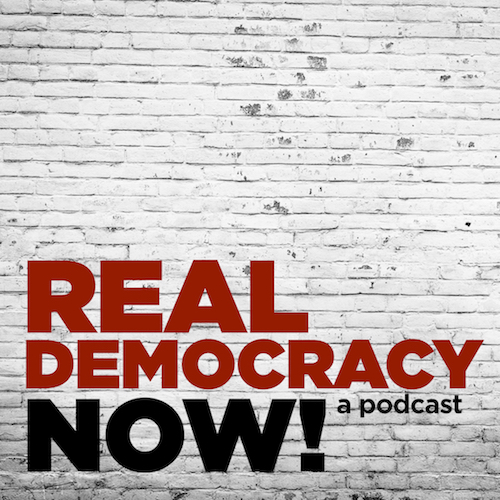Category: One change to democracy
- what for them is the essence of a real democracy? and
- if they could change one thing about our system of democracy what would it be?
This episode is the third episode where I’ve put together a range of my guests’ answers to the question:
If you could change one thing about our system of democracy, what would it be?
We are very near the end of Season 2 – only three episodes to go and I will soon be starting interviews for Season 3 about elections, voting and alternatives.
I intend to continue to ask all of my guests their view on what is the essence of a real democracy.
I’m thinking of replacing the ‘one change’ question from Season 3 onwards and would appreciate your ideas on a new question.
Please send your suggestions either via email to nivek@realdemocracynow.com.au or let me know via Twitter or Facebook. I’ll be starting the interviews for Season 3 soon and would like to have the new question ready for those interviews.
First up we hear from Professor Gerry Stoker who was part of episode 12 in Season 2 talking about the democratic deficit. Gerry is Professor of Governance within Social Sciences: Politics and International Relations at the University of Southampton. He is also the Centenary Professor of Governance in the Institute for Governance and Policy Analysis at the University of Canberra. In this episode, Gerry outlines both what his research says about what citizens would like changed as well as sharing his views.
The next person is Dr Roslyn Fullerwho was my guest on episode 2 in Season 2 talking about the role of direct democracy in ancient Athens.Roslyn is a Canadian-Irish academic and columnist, specializing in public international law, and the impact of technological innovation on democracy.She’d like to see quite dramatic change, although she does recognise it may take time.
Up next is Max Hardy who was a guest in Season 1 episode 11 talking about facilitating deliberative mini-publics in Australia. Max is the Principal at Max Hardy Consulting where he works with leaders and organisations to achieve results through collaboration. Not surprisingly Max would like to see citizens involved more directly in decision-making.
Carolyn Lukensmeyerwas also a guest in Season 1 episode 13 talking about her work with America Speaks. Carolyn is currently the Executive Director of the National Institute for Civil Discourse, an organisation in the United States that works to reduce political dysfunction and incivility in the political system. She identifies two changes, both institutional, that she would like to see.
Ben McPeek shared his experience as a member of the Residents’ Reference Panel for the Davenport Community Rail Overpass project in episode 17 of Season 1. He identifies the need to respect expertise.
Caroline Victor was a member of the Dogs and Cats Citizens’ Jury in South Australia and was also part of episode 17 in Season 1. She would like democracy to make more use of technology.
I first spoke with Didier Caluwaertsin episode 14 in Season 1 about the G1000 in Belgium.Didier is an Assistant Professor of Public Policy at the VUB. He would like to set up systems which support a long-term focus in decision-making.
Emily Jenke shared her experiences designing and facilitating deliberative mini-publics in South Australia in episode 10 of Season 1. Emily is a co-CEO of Democracy Co a consultancy focused on helping people come together to consider complex issues and make lasting decisions. She identifies two changes both of which are structural.
And finally, Professor Janette Hartz-Karp would I spoke with in episode 5 of Season 1 about her work in Western Australia designing and managing large deliberative mini-publics. Janette is a Professor in the Sustainability Policy Unit at Curtin University in Western Australia. Janette would like to see much more co-decision making.
Thank you for joining me today. In the next episode of Real Democracy Now! a podcast I’ll be talking to a number of people about the relationship between representative democracy and capitalism. I hope you’ll join me then.
- what for them is the essence of a real democracy? and
- if they could change one thing about our system of democracy what would it be?
I ask all of my guests two questions:
- what for them is the essence of a real democracy? and
- if they could change one thing about our system of democracy what would it be?
- Adam Cronkright from Democracy in Practice. I interviewed Adam in episode 1.12 about the work of Democracy in Practice in schools in Bolivia.
- Associate Professor Caroline Lee. Caroline was part of episode 1.19 where we considered different critiques of deliberative mini-publics.
- Associate Professor Daniel Pemstein was part of episode 2.3 about his work on the Varieties of Democracy Project and the Unified Democracy Scores.
- Professor Carson was my first guest in episode 1.1 where she explained the basics about deliberative mini-publics.
- Professor Graham Smith who has been part of a couple of episodes now – episode 1.8 where he talked about the UK Citizens’ Assemblies and episode1.18 where he outlined his approach to evaluating deliberative mini-publics.
- Professor Cristina La Font was also part of episode 1.19 where she explained her critique about some uses of deliberative mini-publics.
- Professor Paul Cartledge was our first guest in Season 2 where he took us through a potted history of Ancient Greek democracy. and
- Associate Professor Genevieve Fuji Johnson was one of the guests on episode 1.19 critiquing deliberative mini-publics.
